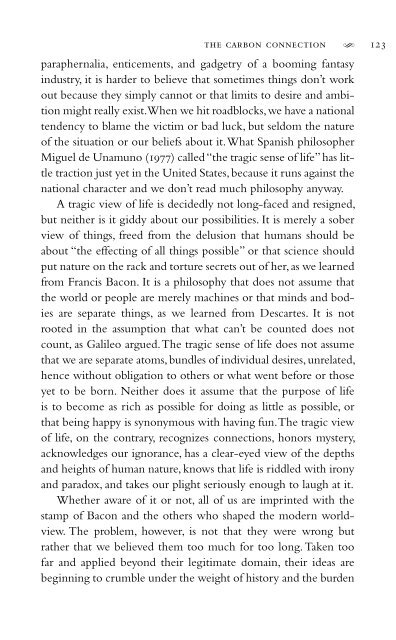Down to the wire : confronting climate collapse / David - Index of
Down to the wire : confronting climate collapse / David - Index of
Down to the wire : confronting climate collapse / David - Index of
Create successful ePaper yourself
Turn your PDF publications into a flip-book with our unique Google optimized e-Paper software.
<strong>the</strong> carbon connection S 123<br />
paraphernalia, enticements, and gadgetry <strong>of</strong> a booming fantasy<br />
industry, it is harder <strong>to</strong> believe that sometimes things don’t work<br />
out because <strong>the</strong>y simply cannot or that limits <strong>to</strong> desire and ambition<br />
might really exist. When we hit roadblocks, we have a national<br />
tendency <strong>to</strong> blame <strong>the</strong> victim or bad luck, but seldom <strong>the</strong> nature<br />
<strong>of</strong> <strong>the</strong> situation or our beliefs about it. What Spanish philosopher<br />
Miguel de Unamuno (1977) called “<strong>the</strong> tragic sense <strong>of</strong> life” has little<br />
traction just yet in <strong>the</strong> United States, because it runs against <strong>the</strong><br />
national character and we don’t read much philosophy anyway.<br />
A tragic view <strong>of</strong> life is decidedly not long-faced and resigned,<br />
but nei<strong>the</strong>r is it giddy about our possibilities. It is merely a sober<br />
view <strong>of</strong> things, freed from <strong>the</strong> delusion that humans should be<br />
about “<strong>the</strong> effecting <strong>of</strong> all things possible” or that science should<br />
put nature on <strong>the</strong> rack and <strong>to</strong>rture secrets out <strong>of</strong> her, as we learned<br />
from Francis Bacon. It is a philosophy that does not assume that<br />
<strong>the</strong> world or people are merely machines or that minds and bodies<br />
are separate things, as we learned from Descartes. It is not<br />
rooted in <strong>the</strong> assumption that what can’t be counted does not<br />
count, as Galileo argued. The tragic sense <strong>of</strong> life does not assume<br />
that we are separate a<strong>to</strong>ms, bundles <strong>of</strong> individual desires, unrelated,<br />
hence without obligation <strong>to</strong> o<strong>the</strong>rs or what went before or those<br />
yet <strong>to</strong> be born. Nei<strong>the</strong>r does it assume that <strong>the</strong> purpose <strong>of</strong> life<br />
is <strong>to</strong> become as rich as possible for doing as little as possible, or<br />
that being happy is synonymous with having fun. The tragic view<br />
<strong>of</strong> life, on <strong>the</strong> contrary, recognizes connections, honors mystery,<br />
acknowledges our ignorance, has a clear-eyed view <strong>of</strong> <strong>the</strong> depths<br />
and heights <strong>of</strong> human nature, knows that life is riddled with irony<br />
and paradox, and takes our plight seriously enough <strong>to</strong> laugh at it.<br />
Whe<strong>the</strong>r aware <strong>of</strong> it or not, all <strong>of</strong> us are imprinted with <strong>the</strong><br />
stamp <strong>of</strong> Bacon and <strong>the</strong> o<strong>the</strong>rs who shaped <strong>the</strong> modern worldview.<br />
The problem, however, is not that <strong>the</strong>y were wrong but<br />
ra<strong>the</strong>r that we believed <strong>the</strong>m <strong>to</strong>o much for <strong>to</strong>o long. Taken <strong>to</strong>o<br />
far and applied beyond <strong>the</strong>ir legitimate domain, <strong>the</strong>ir ideas are<br />
beginning <strong>to</strong> crumble under <strong>the</strong> weight <strong>of</strong> his<strong>to</strong>ry and <strong>the</strong> burden
















